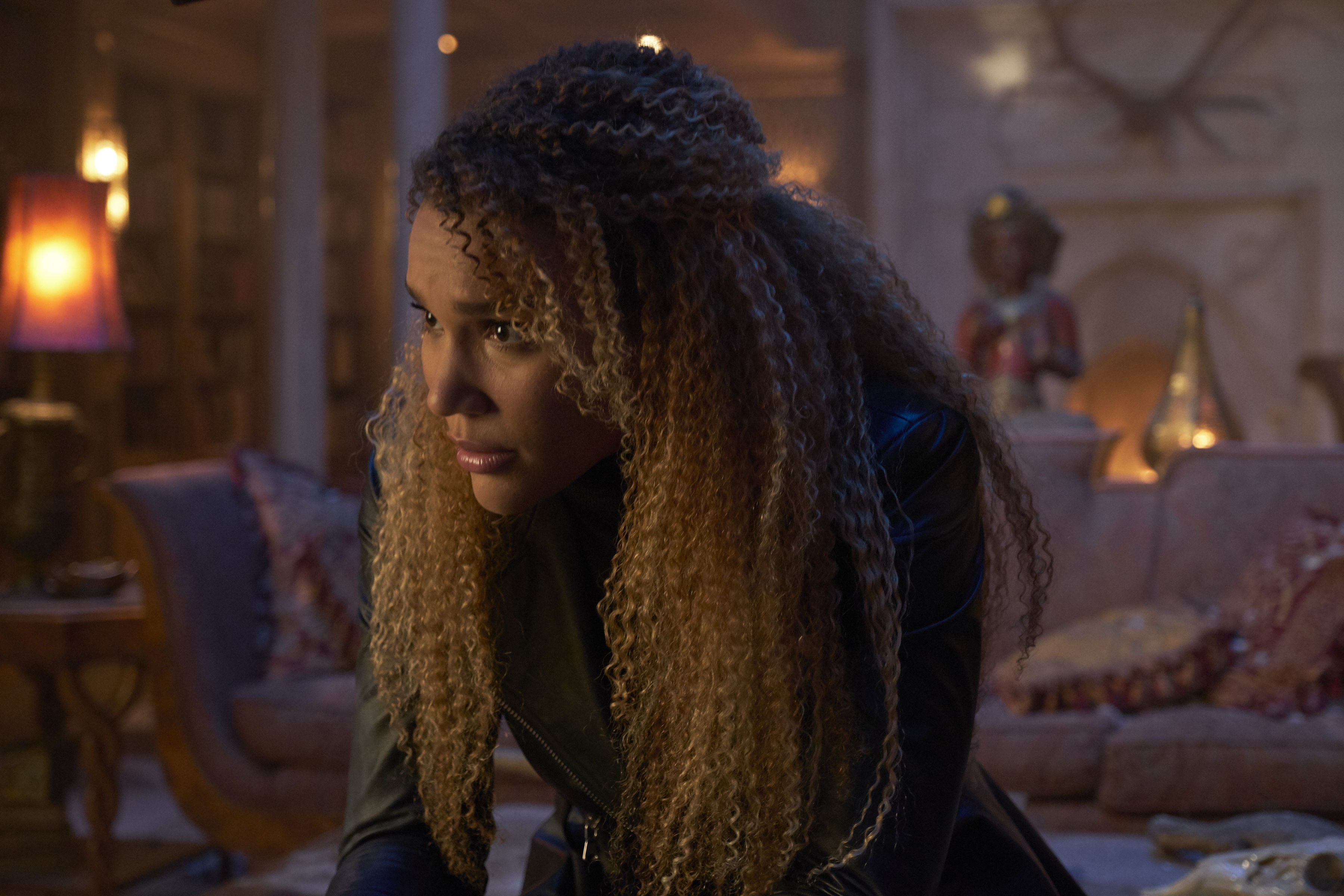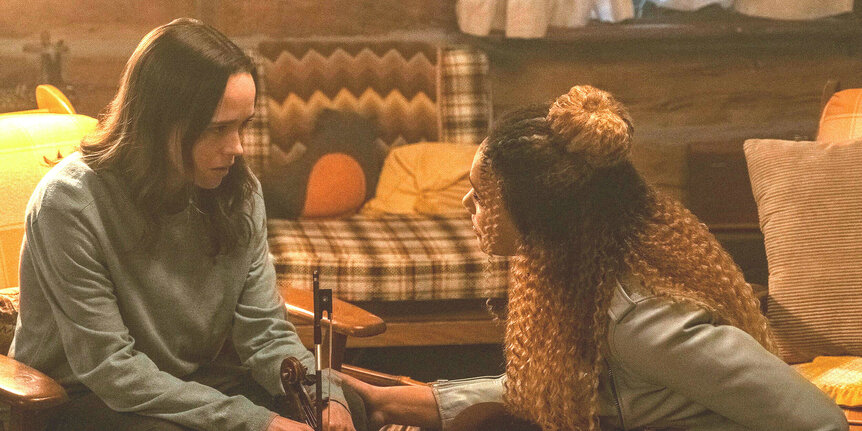Create a free profile to get unlimited access to exclusive videos, sweepstakes, and more!
The Umbrella Academy's greatest superpower is sisterhood

The Umbrella Academy is weird.
There’s just no getting past that label. It’s how review sites have categorized it, it's how critics have described it (though, to be fair, they’ve interchanged the word with phrases like “batsh*t crazy,” “completely bonkers,” and “The Royal Tenenbaums meets X-Men”), it’s even how the show has chosen to market itself.
And we get it. There’s a monkey butler, an eerily human robot, and Mary J. Blige plays a time-traveling hitwoman. “Weird” is an earned reputation.
And though we love a good superhero story, there’s more to this comic book series from My Chemical Romance frontman Gerard Way than doomsday scenarios and doughnut-store shootouts. In fact, as inventively fun and well scored as the action sequences are on this show, it’s the complicated family dynamics, the dysfunctional relationships between its main characters, that truly feel deserving of headlines.
Spoilers for The Umbrella Academy within.
Of course, most of the bickering comes in the form of toxic masculinity manifesting thanks to some unresolved daddy issues between the male leads.
Each of the Hargreeves children has a special ability, and early in their childhood their adoptive father — an eccentric billionaire with an odd love of monocles — ranked them in terms of their powers. Luther Hargreeves, the strongest of the bunch, was the family golden boy, referred to as number one by dear old dad. His brother Diego, knife-thrower extraordinaire, always came second best. The bitter rivalry between the two kids grew to become an unavoidable, problem-causing resentment as they aged to adulthood. They squabble, they moan about their respective lots in life, they waste energy trying to one-up each other at every turn.
They are, in short, emotionally stunted man-children who just can’t seem to grow up.
The rest of the siblings — Klaus, who can converse with the dead and has a serious drug addiction because of it; Ben, sadly deceased but somehow still always present; Allison, a woman who can alter reality through whispered rumor; Number Five, the time traveler; and Vanya, the ordinary of the bunch — have their own childhood trauma to work through, which leads to a splintering of the family as a whole. Diego and Luther might be at each other’s throats, trying to inflate their own egos until they cast a large enough shadow over the other, but most of the Hargreeves children retreat to their small corners of the world, aimlessly wandering, trying to mend what’s been broken by their upbringing on their own. It’s heartbreaking, really, to see these orphans longing for love and acceptance by the people who should have the easiest time giving it: their siblings, who are also “other” and unloved.
It’s also what contributes to the end of the world.
No superhero story is complete without an impending apocalypse, and for most of the show stopping one is what reunites the Hargreeves children.
But while Luther and Diego bicker, Klaus gets high, and Number Five carries on a concerning relationship with a mannequin named Dolores, it’s the women of The Umbrella Academy who put in the most work to save the planet, and they do it by trying to save each other.
In fact, in a world saturated with alternate realities and unnatural happenings, it’s the very real, commonplace bond of sisterhood that might just be the greatest superpower of them all.
While all the Hargreeves children have complicated relationships with each other, Allison and Vanya are the only sisters of the bunch. The pair have been unknowingly linked since they were young, with their father using Allison’s ability to mask the untamed power Vanya could never seem to control. Sadly, we’re not treated to many flashbacks of the women as young girls, though Allison constantly expresses regret for how she treated Vanya.While the boys are off performing heroics, Allison’s only concern seems to be for Vanya, a woman who has been ostracized by her family after writing a tell-all of their childhood experiences. And Vanya seems to reciprocate that love. The two plan sleepovers, share sweatpants, buy each other bagels. They dig and pick at each other’s insecurities — Allison worries she’s ruined her relationship with her daughter because of her powers, while Vanya fights a constant longing to feel included in the group — but they’re soft with each other too, in ways none of the Hargreeves men seem capable of. Each of the siblings seem to view their family as a burden, they see each other as competitors, or worse, disappointments, but Vanya has a genuine affection for her brothers and sister, even when they don’t deserve that love, and Allison harbors a concern and compassion for her sister that can only be born from having a child of her own.
In fact, Allison spends the majority of the season hoping to connect with Vanya. She spots the danger in her relationship with Leonard Peabody — a murderer obsessed with the Hargreeves family who ingratiates himself with Vanya by feeding into her worst insecurities. Allison puts herself at risk, investigating Leonard, trying to warn Vanya of his true nature, exposing her own past hurts to protect Vanya from the same outcome.
Of course, Vanya’s blinded by her own distorted view of herself, accepting the love she thinks she deserves, but even the worst of their arguments over Leonard, their family, and their own mistakes are followed up with apologies, regret, and a longing to do better by one another.
When Vanya comes into her power, manipulated by Leonard to believe her family fears and even hates her, it’s Allison who comes to her rescue. She doesn’t know that Vanya will soon cause the apocalypse, she isn’t so preoccupied with saving the goddamn world like her brothers are that she can’t see her sister’s suffering. She goes on her own to protect her sister, to save someone close to her instead of trying to be the hero of everyone.
Vanya reacts poorly to Allison’s perceived intrusion of her life. Years of built-up anger and trauma unleash themselves and she commits the worst kind of sin — she hurts her own sister. At this point, we might imagine that any bond between the two women has been sliced as effectively as Vanya slices Alison’s throat with her violin bow, but it’s Vanya’s reaction to her sister’s supposed death that proves how connected they were. She’s immobilized by grief, trying to rationalize what happened, fearful of her family’s reaction, in disbelief that she was capable of something so heinous.
And when Allison is eventually mended, saved by her brothers, she faces Vanya again. This time, Vanya is locked in a soundproof room, caged by Luther until he can decide what should be done with her. For Luther, and the rest of the boys, Vanya is simply a threat to be neutralized. They can’t look at her with compassion, they can’t see that they’re committing the same mistakes their father made so many years ago, mistakes that resulted in Vanya feeling confused, lost, and unloved. Even when Klaus and Diego put up a feeble fight against Luther, demanding she be set free, there doesn’t seem to be much passion behind it. Their shock at the injustice of seeing their sister locked up quickly fades when the necessities of world-saving and more selfish pursuits make themselves known. But Allison sees her sister, she sees Vanya’s pain and loneliness and empathizes with it. She tries to rescue her, to set her free, and when Vanya eventually sets out on her warpath, seemingly too far gone for any of the siblings to reach her, it’s Allison who continues to try.
Ultimately, Allison chooses to save Vanya, not the world, which may be viewed as a selfish decision until Number Five realizes that, in any alternate timeline, Vanya will always be the cause of the apocalypse. Killing her, as Luther and the others seemed to want to do, won’t solve anything, only fixing her brokenness will. It’s what Allison instinctively knew from the beginning, it’s a solution that seemed alien to the men around her, men suffering from inflated egos, lacking purpose, and distracted by their own hubris that they couldn’t take the time to simply see the anguish their own sister was living with, and to care enough to try to help.
It’s rare, in the comic book world, that we’re treated to stories of girls supporting girls. It’s why we gush over the friendship between Captain Marvel and Maria Rambeau, it’s why we GIF the hell out of Black Widow and Okoye rescuing the Scarlet Witch in Avengers: Infinity War, it’s why a Harley Quinn-led girl squad seems so revolutionary. We all crave the bond of sisterhood because we instinctually know how powerful and empowering it can be, but to see it on screen is such a rarity.
Which is why The Umbrella Academy deserves more credit, not just for making something fun and weird and entertaining, but for recognizing the power all women are capable of when we come together, when we fight for each other.



























